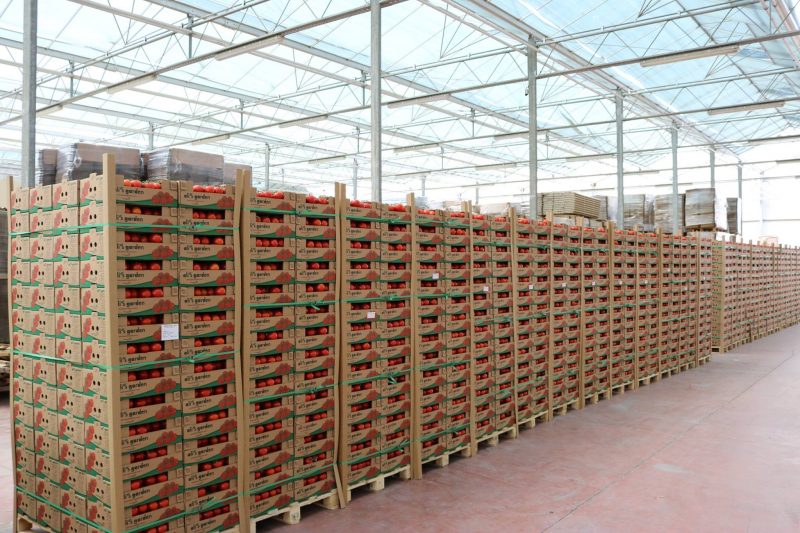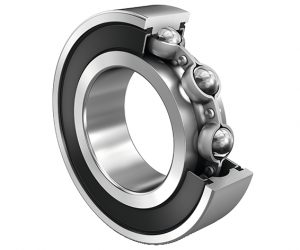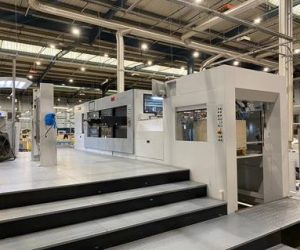

Gluing trays quickly and sustainably
Turkish machine builder Osman Çubuk Makine Ltd. Şti. have developed a new variant of the tray former KKM 1 with Robatech. Dot application instead of bead application resulted in resounding success: 25% increase in production and 50% less adhesive consumption!
They are in demand wherever loose goods such as fruit, vegetables, baked goods, or confectionery products are transported: trays. Previously made of wood, the transport boxes are now mainly made of corrugated and solid cardboard. Turkish machine manufacturer DMS Osman Çubuk Makine Ltd. Şti. is familiar with this development. The family business started in 1960 with the production of wooden tray machines in Izmir.
Since 2005, DMS has mainly been manufacturing tray formers for cardboard boxes. The machines erect flat cardboard boxes and glue them to form stable, stackable trays for the food and beverage industry.
A Long-term Partnership
As early as 2005, DMS decided to equip its tray formers exclusively with Robatech adhesive application systems. The feedback from the customers spoke for itself: reliable gluing and reliably running systems.
“We were pleasantly surprised by how well Robatech’s global support took care of our customers all over the world,” explains Erhan Çubuk, owner of DMS. “Here on site, we benefit from the ideas and solutions that Robatech Turkey continuously brings to our projects. This creates a lot of trust. We can respond very flexibly to special requests from our customers. Robatech has an extensive product portfolio.”
The Challenge: Speed and Sustainability
In 2018, the Turkish machine manufacturer DMS Osman Çubuk Makine Ltd. Şti suddenly faced a major challenge. “Customers demanded an increase in tray production rate and wanted to save adhesive at the same time,” Erhan Çubuk describes in retrospect. “Previously, we had used the robust AX Diamond compressed air-controlled heads on our standard machines and intermittently applied beads to the two cardboard flaps of the trays. We required 2.5 grams of adhesive per cardboard box for reliable gluing.”
The Problem: Operating Cycles and Service Life
An increase in the production rate requires a higher production speed. For an application head, this means
shorter closing times. If shorter beads or even small dots should also be applied to save adhesive, the closing times must be even shorter. “Depending on the operating mode, the wear parts of a compressed air-controlled application head can then reach the end of their service life after just a few months,” explains Hakan Tanriöven, Sales Manager Robatech Turkey.
The Solution: Stitching and Durability
It was clear to Hakan Tanriöven that SpeedStar Compact offered the ideal solution. “The electromechanical application head can apply very small dots (stitching) at very high speeds. With 500 million operating cycles, it has an exceptionally long service life. A special nozzle on the jetting element can be used to apply two lines of adhesive per head. This is advantageous for reliably gluing trays,” says the Sales Manager of Robatech Turkey. “In addition, we only need two application heads per side flap. With stitching, 1.2 grams of adhesive are sufficient per box.” Satisfied, Erhan
Çubuk from DMS adds: “The investment costs are higher compared to a pneumatic application head, but they pay for themselves quickly. The new tray former variant requires 50% less adhesive and erects 6 more cardboard boxes per minute than the standard machine.”
The Icing on the Cake
To increase the safety of the operating personnel and avoid unscheduled downtimes, DMS equipped the new tray former with the Concept Stream tankless melter and an automatic filling system for granulate adhesive. “This allows us to offer our customers a very safe and sustainable adhesive application system that can be used to glue trays quickly and reliably,” concludes Erhan Çubuk.
For more information go to www.robatech.com.





